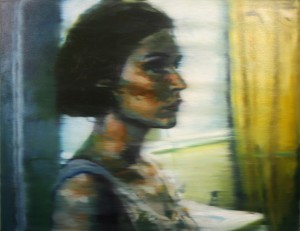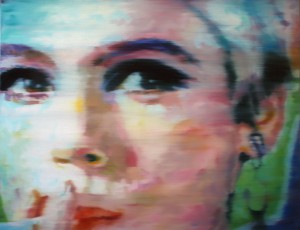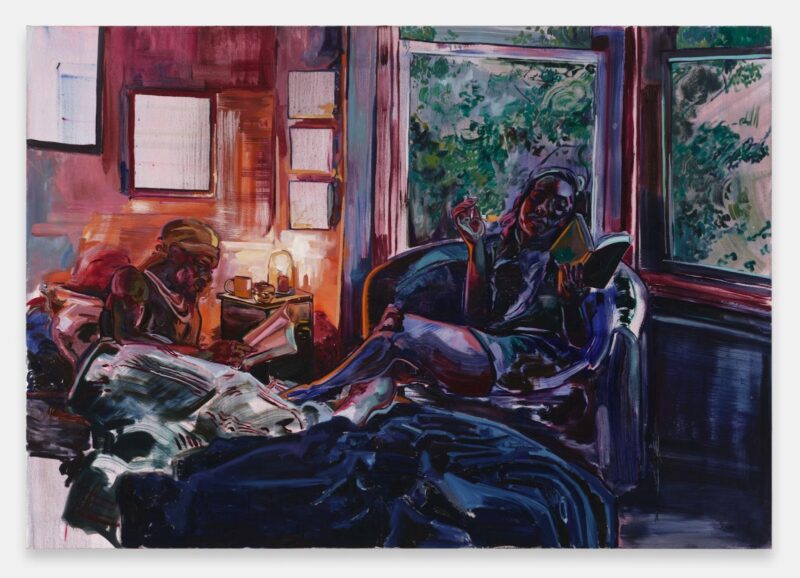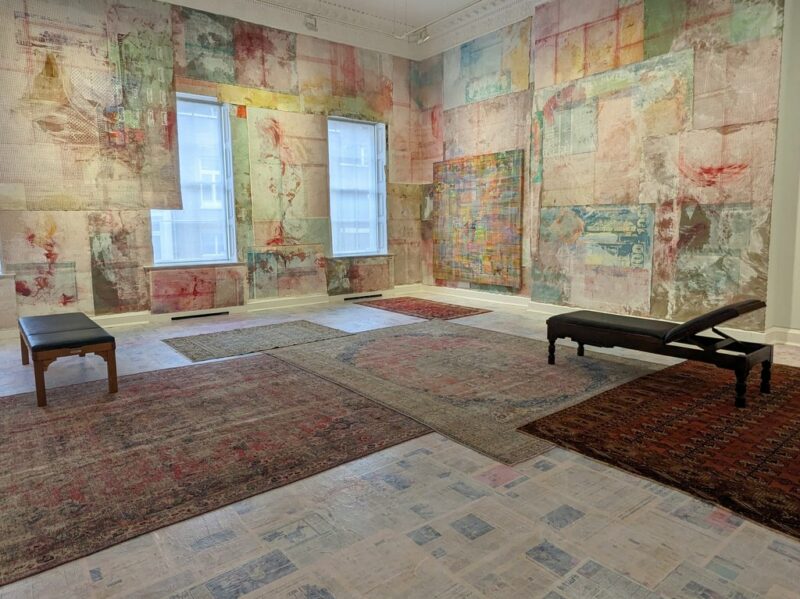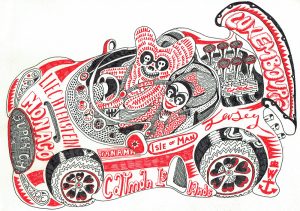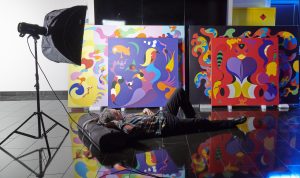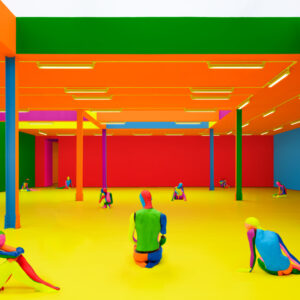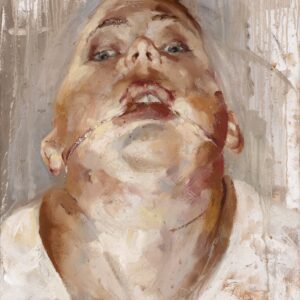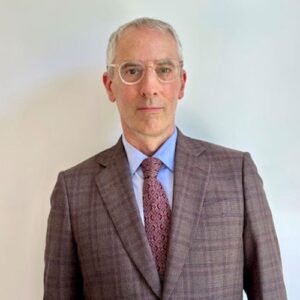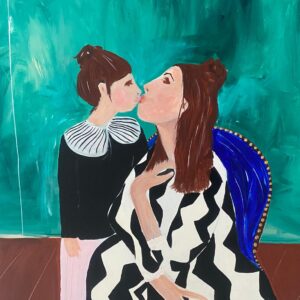1 When did you start to make art?
I’ve always been making art. I loved to draw when I was kid. I remember I would often draw detailed action scenes. One of my favourite subjects was King Kong hanging from a New York skyscraper. The scenes where very animated, I would keep drawing new things into the scene to move the story along. I was drawing purely for myself, to entertain myself. When I was about 14 I won a competition to paint a mural in the disco room of my local youth club. At that age I wasn’t particularly academic at school but I always had total confidence in abilities as an artist. I painted on every single bit of wall in that disco room, directing my friends to help fill in areas of colour, and loved every minute of it. Art and design just came naturally to me, I never questioned it.
2 How did you evolve into a professional artist?
After graduating art school in Newcastle, I went south to Leeds to help with the start up of a new family business – “Art’s Café”. It was a Café, bar, restaurant, music venue and gallery. The café quickly became a cultural hub in Leeds it was an exciting time. As well as helping to run the business as a whole, I would curate the art exhibitions. Naturally I began to show my own work in the café and after a while I had sold most of my paintings from University. Then I moved to London and became a scenic artist painting sets and backdrops mostly for Pop video shoots. It was an amazing training in how to be creative and resourceful. My big break came when I took my work to the Clapham Art Gallery. My work instantly started to sell through the gallery and I was able to stop painting for pop videos and go full time in my studio.
3 What drove you to make art as a professional vocation?
Making art comes naturally to me, its my passion in life. So it’s natural to me that I would make it my profession. I never considered doing anything else.
4 Explain your inspiration?
I’m inspired by many things. When I was young I was inspired by my parents (both designers), by artists, by comics and illustration, by music, by TV and film, by anything creative that I saw and heard.
The paintings I make now are largely inspired by the way I looked at the world when I was young.
5 In what way does your inspiration transform into ideas?
An idea for me is a decision; a decision to make what inspirers me into something tangible. Its like grabbing hold of one little aspect of you inner imagining’s and making it in to something that others can see to.
6 From Ideas to production of art – how? And why?
Like most artists I have my own particular habits, processes and way of going about things. I use TV, the internet, newspapers, magazines, VHS tapes, 35mm film, digital photography, charcoal, paint , canvas, anything and everything that seems to be the best method to get the idea made. These processes and materials all inform and alter the end result. I love the way images are transformed when they move from one process or medium to another.
7 Could your ideas be portrayed in any other medium? If so which?
I have recently been experimenting with moving image, using digital video. It has been extremely interesting to work with images in a similar way to when I create paintings, but with the added dimensions of time, movement and animation. It’s something I really want to explore further.
8 Which artists would you most like to blatantly rip off?
I don’t want to blatantly rip off anyone. It’s important to be inspired by other artists. I recently saw Whitney Mc Veigh’s portraits in a show in London and was very impressed with her approach to painting the figure. So it was very interesting to read her interview on this site.
9 Why is your art made?
I like making it. Its work I enjoy.
10 What does being an artists mean to you?
It means a constant dialogue with yourself. It means being free.
11 Are you happy with your reasons for making art? i.e. Are there any trade offs that make life hard?
There is a strange kind of duality to being an artist. There is often the anxiety of where your next pay cheque is coming from, but this is balanced out by a unique sense of freedom.
12 When does your art become successful?
I don’t spend any time considering whether things are successful or not. Once I’ve finished working on something I quickly turn my attention to the next thing.
13 What is art?
14 How do you start the process of making work?
I collect images all the time, bits of film and TV mostly but also cuttings from newspapers and magazines and more recently from the internet. I collect the images without any specific idea for a finished work. I collect anything I like the look of and file it away for a rainy day. An idea for a painting is often prompted by a feeling or memory of one of the images in the collection.
15 Who prices your work? And how is the price decided upon?
I work with the galleries to price the paintings. I think its natural for the price of your work to rise steadily as you move on in your career.
16 What is your next; move, project, show etc?
I’m starting an MA in September. Doing an MA at this stage in my career is bound to be an interesting process. I hope to use the course to build on my current practice and expand it into new directions.
17 What are the pros and cons of the art market?
Far too many to mention. It’s a necessary evil. Artists need a place to sell work so there’s a market place in which to do so. You need to find good people to work with who you can trust and who can help you navigate your way through the market.
18 Which pieces would you like to be remembered for?
I’m always looking forward to the next piece or project, so its hard to say. The next piece I do always feels like its going to be my best yet. So I guess I’d like to be remembered for the next piece I do.
19 Any routine in making your artwork? If so what?
I tend to work in fits and starts. I have bursts or creative energy when I’m painting all the time, especially in the lead up to gallery shows. Then I’ll have periods when I’m not painting as much and spending my time collecting imagery and playing around with ideas or going to shows. There’s a lot more to being an artist than producing the work, you also have to be your own PR and marketing manager, secretary, accountant etc.
20 What has been the biggest break in your career?
I gave myself my biggest break, in having the self-belief to keep making work and showing it to the world.
21 Who has been the biggest influence on you?
I can’t say for sure. I’m being influenced all the time by artists, family, friends , people I meet and things I see. When I was growing up my parents where a great influence on me, they couldn’t have been more encouraging.
22 How many artworks have you given away and to whom?
I‘ve given work to family and friends in the past. It’s harder to give work away nowadays as I need to exhibit everything I do. I hope I’ll be able to create the opportunity in my career to give work away again. I’ve always drawn cartoons to give away to people and I still do that all the time.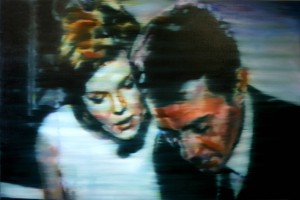
Dans site: LINK:
His Gallery: LINK
